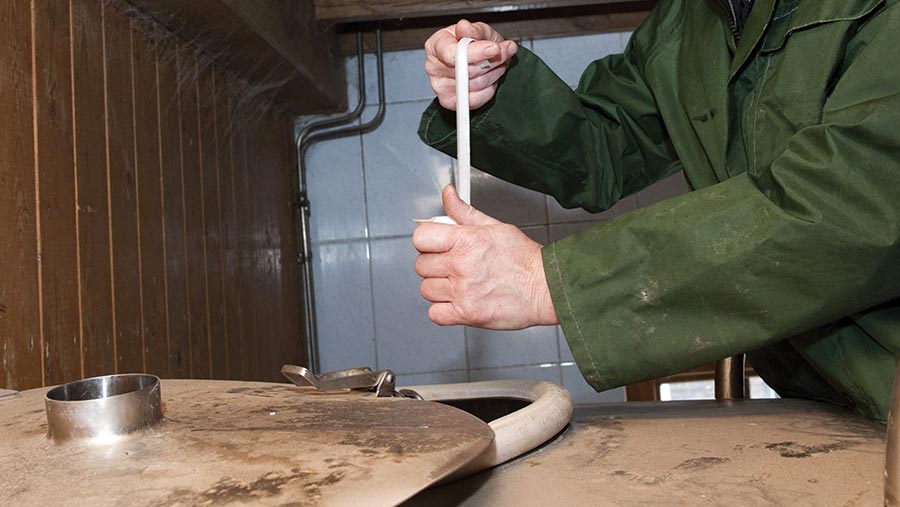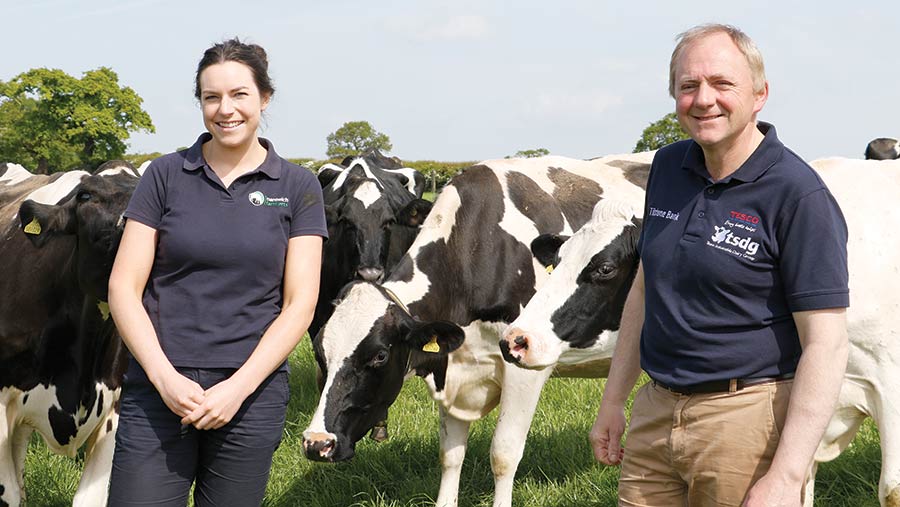How MilkSure training helps cut medicine milk failures

About three farms in Britain have a bulk tank milk antibiotics failure every day.
It is illegal to sell milk from an individual cow that has medicine residues above the maximum residue limit (MRL).
This law – and stringent testing procedures used along the supply chain – exists to ensure that milk for human consumption is ultimately safe and free from potentially harmful medicine residues.
See also: 4 areas where dairy farmers can cut antibiotics use
But medicine failures still represent a huge cost to the industry, with contaminated milk that has already made it to the depot having to be disposed of safely at the farmer’s expense to the tune of about £15,000/load.
MilkSure is a training course available for British milk producers developed by Dairy UK and the British Cattle Veterinary Association (BCVA) and delivered by vets to help prevent accidental failures occurring on farm.
Independent vet Owen Atkinson, of Dairy Veterinary Consultancy, who delivers MilkSure training for farm vets, says many UK milk buyers are now concentrating on reducing failures due to growing concerns about antibiotics resistance.
He says the availability of newer tests means a greater range of medicines can be found, and at lower concentrations.
“The rules haven’t changed but the ‘goal-line’ testing technology has,” he explains.
“Everyone needs to be absolutely on their game to reduce our failure rate, particularly as tests become more sensitive.
Human error and equipment failure explain some tank failures, but failures can also occur because farmers don’t always understand the correct withdrawal periods – for example, when extended treatments are given.”
MilkSure is playing a big part in the drive by industry representative Dairy UK to lower the failure rate and some milk processors have already made the course a contractual obligation for their producers.
For example, any Muller milk producers that have a medicine residue failure must complete the course within three months.
“Dairy UK has an objective that every milk producer does the course. Some processors are starting with the farmers that have had failures, while others are targeting their whole milk fields,” says Mr Atkinson, adding that it’s all about education and taking a proactive approach on farm.
“Milk is a great product, but it does come in for attack from certain quarters. One thing that understandably worries consumers is whether their food contains any medicine residues, and protecting the clean image of British milk is hugely important.
“Our failure rate in the UK is lower than in many countries, but it isn’t the lowest. For example, in America, farmers can’t sell their milk unless they have a similar kind of accreditation done with their vet once a year, and this has led to a residue failure rate that is some 20 times lower than ours.”
About MilkSure
What is MilkSure?
A training course for British milk producers, launched in November 2017. It was developed by Dairy UK and the British Cattle Veterinary Association (BCVA) to reduce the risk of medicine residue in milk.
What does it involve?
Training takes place on farm and lasts approximately three hours. It is delivered by the farm’s own vet because they are familiar with the farm and take responsibility for medicines used there.
The training is based on a workbook and is broken down into two parts:
- Part one A discussion about why medicine residues matter, how they are calculated, the main reasons failure occurs, testing procedures for residues, and milk withdrawal periods.
- Part two The vet and farmer(s) work together, looking at what medicines are used within the herd and identifying the main risks for medicine residue on the farm in question. This is followed by a 20-minute online test to ensure the main principles have been clearly understood (farmers get two chances to complete this correctly).
What happens once you pass the course?
The farm becomes MilkSure accredited and receives a certificate. The course is also worth seven Dairy Pro points for individuals who pass the test. A register of all accredited farms is kept.
How much does it cost?
Farmers must register for the course online first. Registration costs £65 including VAT per farm and the nominated vet will then be sent training materials. Vets can pay to go on a course delivered by the BCVA, but this is voluntary. The cost of the farmer training must be agreed with the farm’s own vet.
Q How do I sign up?
Register online at www.milksure.co.uk. Once you sign up you have three months to complete the course.
Case study: Tom Mansell, Tilstone Bank Farm, Tarporley, Cheshire
Dairy farmer Tom Mansell completed the MilkSure course in February as a refresher for him and his staff at Tilstone Bank Farm, where they milk 220 cows.
He first heard about the training course at a Tesco Sustainable Dairy Group meeting and despite not having had problems with milk failures, he felt it was important to ensure they were using the right medicine for the right job and there was no risk of antibiotics failure.
His vet, Amy Cox from Nantwich Farm Vets, carried out the training. Miss Cox went on a one-day BCVA course and has since delivered training to a number of clients.

Amy Cox and Tom Mansell
Farm facts
- Milking 220 Holstein Friesians
- Farming 172ha on a Wellcome Trust Tenancy
- Year-round calving
- Averaging 9,000 litres a cow at 4.10% butterfat and 3.39% protein
- Cell counts running at 100 and bactoscan 12
- Achieving 4,600 litres from forage, with cows grazed from March to November
- Supplying Muller/Tesco
- Employs two full-time staff and one part time
The process
Mr Mansell made sure all farm staff were present at the meeting and it was on a day when they had plenty of time.
Things were going well anyway, but it provided them with an opportunity to update protocols, the herd health plan and remind staff of procedures, says Miss Cox.
“Ultimately, the responsibility of the safety of the milk lies with Tom. It’s not the fault of the staff if they are not trained adequately,” she adds.
After completing part one of the course (see panel), Miss Cox made sure everyone was clear about how to correctly identify dry and treated cows. At Tilstone Bank Farm, these cows are identified on a whiteboard, in a farm diary and using leg and tail tape.
She also went through the contents of the medicine cabinet and ensured that everyone knew how each medicine should be used and their withdrawal periods.
Improvements
With no historic milk failures, there were very few actions identified.
However, Mr Mansell is using an inhibitory test to double check milk from cows that have passed their milk withdrawal periods and are safe to go in the tank.
Responsible use of medicines
This is all part of a wider drive on the farm to use medicines responsibly, with no critically important antibiotics used on the farm for more than 10 years.
More impressively, in the past 12 months the farm has gone from not using selective dry cow therapy to now only using teat sealant on 95% of the cows following training with Miss Cox last spring.
Mr Mansell said the success has been in part from keeping accurate milk records and maintaining good hygiene and low somatic cell counts of 100.
Cows now only receive antibiotics if their cell counts are averaging over 200 on the previous four to five recordings.
Common mistakes that cause medicine failure and how to overcome them
- Farmers don’t identify dry cows so if they escape into the milking group it can cause a failure. Make sure these are visible to everyone.
- Farmers don’t update treatment protocols
- Large numbers of ‘treatment cows’ being milked alongside milking cows. It is better practice to milk cows under treatment as a separate group last to lower risk.
- Using drugs off label and not applying the correct withdrawal periods.
- Only one person on the farm knows when an animal’s withdrawal period ends. Make sure everyone knows by improving communication.
(Source: Amy Cox, Nantwich Farm Vets)
